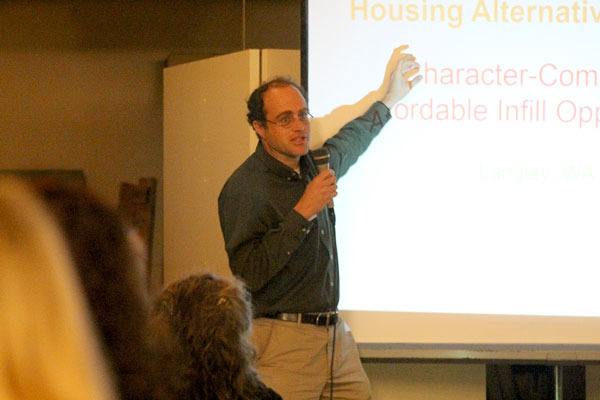If Langley is to tackle its housing-related issues and grow from within city limits, it may need to think small.
Accessory dwelling units, small homes that are adjacent or attached to a single family house, could be a viable solution.
At an affordable housing forum on Wednesday night at Langley United Methodist Church, Eli Spevak, owner of Orange Splot LLC in Portland, Ore., spoke about the success his housing development company has had in doing more with less. The company builds small but functional dwellings meant to fit in with and foster communities. Accessory dwelling units were among many ideas pitched by Spevak. He said the smaller-sized homes are both flexible in where and how they can be built while also minimizing ecological footprints.
“Just making it smaller is really key,” Spevak said.
Spevak said accessory dwelling units are also feasible for all stages of life, have room for creativity and, depending on how they are designed, can include centrally-located common areas which foster interaction between neighbors.
Spevak was among three other panelists at the meeting, which included City Planner Brigid Reynolds, Island County Housing Program Coordinator Catherine Reid and Ross Chapin of Ross Chapin Architects. Around 40 people were in attendance.
Reynolds said city code allows for accessory dwelling units to be built and that it would be consistent with past projects. The city already has housing similar in size and nature, such as the cottages on Third Street and the affordable housing development Upper Langley on Al Anderson Avenue.
While affordable housing in the city isn’t at crisis levels, there are several factors that make it a priority for the city to address, Reynolds said. Among them are an aging population, a school system that is losing students because families can’t find places to live and a lack of housing units for employees of businesses to live in, she said.
“I think it’s very much a priority for council to try and increase opportunities for housing that’s affordable for working families and working individuals,” Reynolds said. “There’s definitely some possibilities.”
Answering questions such as where new and affordable housing could be situated and how it fits into the scale and context of Langley are still on the to-do list. It will all fit into the broader picture of Langley’s future as city staff works to complete its comprehensive plan. As part of the comprehensive plan, the city needs to develop development regulations and potentially modify it to allow for a wider range of housing alternatives, Reynolds said.
Christy Korrow, chair of the Langley Planning Advisory Board, moderated the meeting. She said the board composed of community members is responsible with making affordable housing recommendations to the city council. Korrow was intrigued by the amount of room for creativity and out-of-the-box thinking that were associated with accessory dwelling units. She also said the accessory dwelling units are versatile and cost-efficient.
“It can be fun, creative and really reflect the values of a community like Langley,” Korrow said. “Because they’re small, they’re often inherently affordable.”


